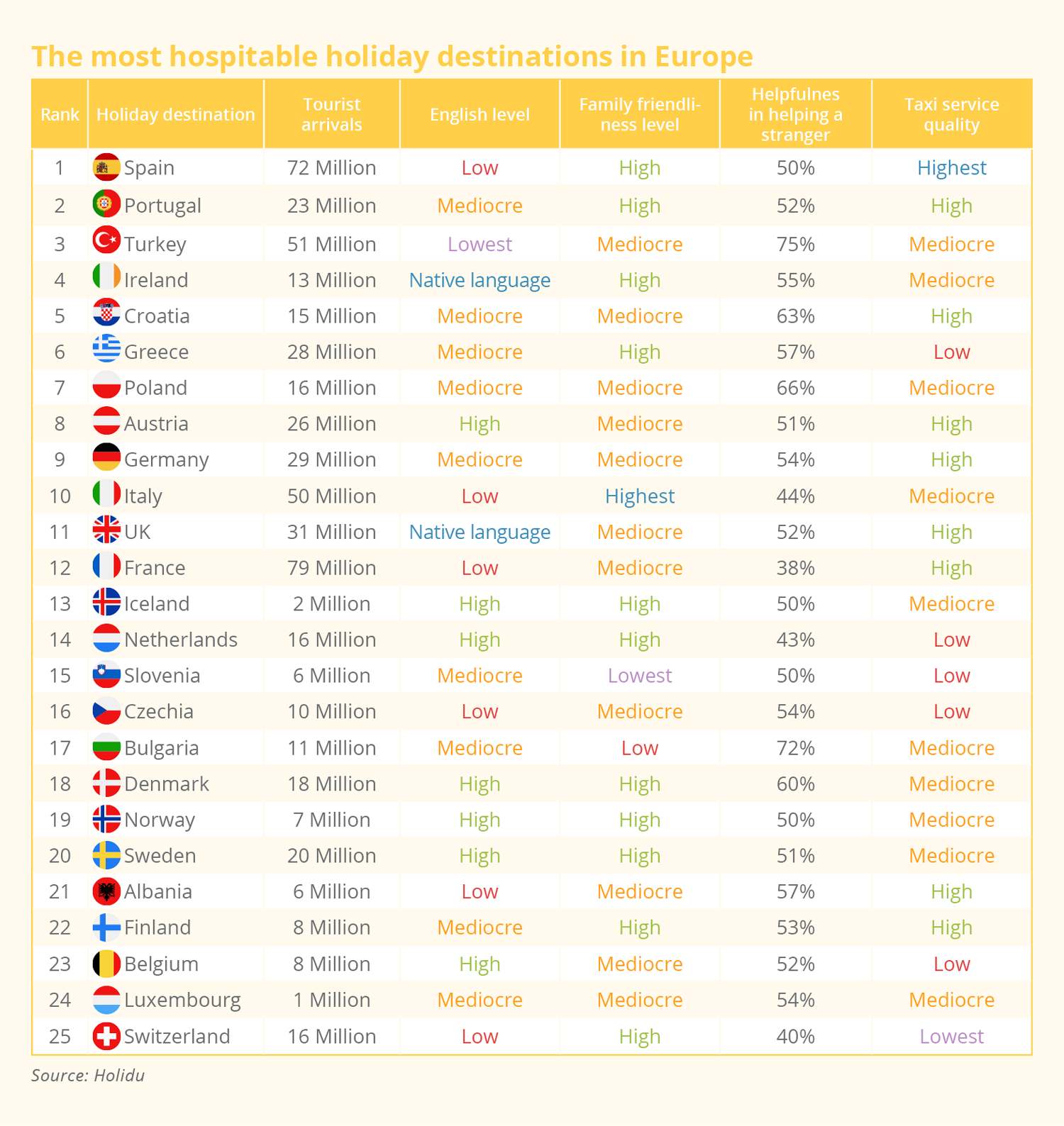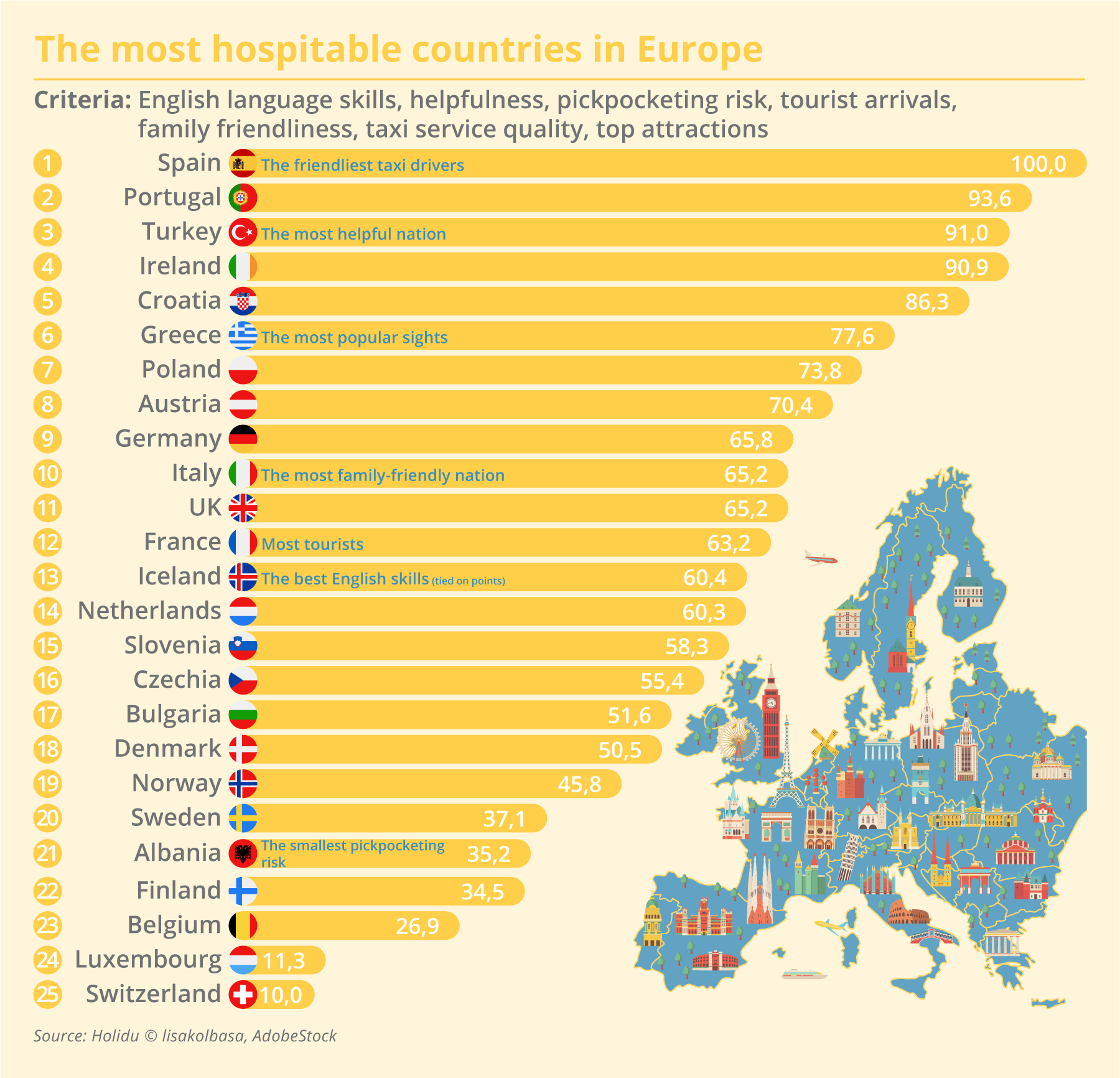These are the most hospitable countries in Europe
The helpfulness of the hosts, the friendliness of the taxi drivers or even the behaviour of the local population are decisive factors that characterise a good holiday. The evaluation of a current comparison of 25 European countries by the holiday home portal Holidu provides information about the hospitality in European countries.
In order to gain a comprehensive insight into various aspects of hospitality and service quality, seven criteria were included in the evaluation: tourist arrivals, English language skills, family friendliness, helpfulness, taxi service quality, top sights and pickpocketing.
Spain, Portugal and Turkey are the most welcoming
The top three places in the ranking are occupied by Spain, Portugal and Turkey. While Spain is particularly family-friendly, Turkey shines with its great willingness to help strangers.
Viva España
Spain tops the results list and is characterised above all by its high number of tourists. According to Holidu, the impressive number of 72 million people who visited the country last year indicates that travellers feel very comfortable and welcome in the country.
As a British study on taxi services in various countries shows, the positive experience often begins at the airport. In no other country are taxi drivers friendlier and more helpful than in Spain. Whether on the mainland, the Balearic Islands or the Canary Islands, the results of the study for Spain show that visitors particularly enjoy their stay in the country and feel that they are treated very hospitably.
As the frontrunner, Spain stands for an exceptional level of community spirit and humanity. This hospitable and helpful culture plays a key role in making visitors feel particularly welcome and supported in Spain. These values are not only deeply rooted in the way travellers are treated, but also in everyday Spanish culture.
In second place is Portugal, where the level of English is limited, but family friendliness and a good taxi service are emphasised.
Turkey shines thanks to its helpfulness
Turkey is in third place and is characterised by a remarkably high willingness to help. Three quarters of the people surveyed have helped a stranger in the last year. The Spanish and Portuguese, who occupy the first two places in the ranking, only show a willingness to help strangers of around 50 per cent. This is all the more astonishing when you consider that the level of English in Turkey is particularly low.
In Bulgaria (17th place), a total of 72 per cent of respondents stated that they had offered help to strangers in the last year. Poland (seventh place) also presents a hospitable picture in this criterion. There, 66 per cent of respondents reported a willingness to help strangers. Other popular holiday destinations with a high willingness to help are Croatia (63 per cent), Denmark (60 per cent) and Greece (57 per cent).

These countries are less willing to help tourists
Popular holiday destinations such as France (38 per cent), Switzerland (40 per cent), the Netherlands (43 per cent) and Italy (44 per cent) scored rather low in the study when it came to the willingness of locals to help. As a guest, you have to be lucky to meet the right person when you need help. In addition to cultural differences, language barriers can also play a role. France in particular is known for having little or no foreign language skills in rural regions. Nevertheless, travellers there can still hope for a friendly face and a helping hand.
This is how hospitable Austria and Germany are
Austria and Germany are among the top ten in the ranking of the most hospitable countries. Austrian taxi drivers in particular shine with their friendliness and service. This has a positive effect on the image of the country, which welcomes around 26 million travellers every year.
With 29 million international tourists, Germany still has room for improvement when it comes to taxi services, but scores highly with its many 5-star sights: 73 per cent of visitors are completely enthusiastic about attractions such as Neuschwanstein Castle or Cologne Cathedral.
However, both Germany and Austria have room for improvement in terms of family friendliness, where they tend to be in the middle of the international field.
The 7 criteria of hospitality at a glance
Holidu used various criteria in the study to determine a ranking of the most hospitable countries in Europe. To this end, 25 popular holiday destinations were analysed according to seven hospitality criteria. These are representative indicators, the evaluation of which is intended to give an indication of a country's hospitality.
Arrivals: This assessed the number of tourists visiting the country in a year. A high number can be an indicator that they feel welcome in the country in question.
English language skills: As the first foreign language in tourism, the extent to which English language skills are widespread in each country was analysed. It is an important factor for communication between travellers and locals.
Family friendliness: This refers to how well a country caters to the special needs of families. A high level of family friendliness indicates that tourism caters to different groups of guests, even if this involves additional effort.
Willingness to help: Based on survey data, we analysed how often locals have offered help to a stranger in the past year. It reflects the general willingness to help and friendliness.
Quality of taxi service: The first impression of a country often begins with the taxi journey. Here we analysed how the quality of taxi service (i.e. the people who transport them) is rated in various holiday destinations in order to find out where the first point of contact for travellers is particularly friendly and helpful.
Great sights to see: Visitor ratings of the 50 most popular attractions were considered here. Not only the quality of the sights, but also the service surrounding the attractions, such as ticket sales and guided tours by locals, are reflected in many positive ratings.
Pickpocketing: The risk of pickpocketing was taken into account as an indicator of the security experienced by travellers in a country. Less crime indicates a more hospitable environment.

Italy shines with family friendliness
Family is very important in Italy. Accordingly, the country stands out as the frontrunner in the survey in this aspect. Families on holiday enjoy a warm and welcoming atmosphere, which is reflected in child-friendly facilities, cultural activities and a relaxed attitude towards the youngest travellers. This family-centric culture makes Italy an ideal destination for holidaymakers with children.
It should always be noted that this is a country comparison that is intended to be thought-provoking. Every country has its own special features and people perceive their environment very differently.
Beware of pickpockets
Being pickpocketed on holiday is probably one of the biggest mood killers. Of all the European countries, it is Sweden (20th place), which is perceived as rather quiet, that has the highest risk of pickpocketing according to police statistics. It is closely followed by the United Kingdom (eleventh place). In these popular holiday destinations, around 2,000 cases per 100,000 inhabitants were registered last year.
 © Gargonia, AdobeStock
© Gargonia, AdobeStock
Language brings people together
A real game changer for travellers is communicating in the same language. English language skills play a key role, especially when it comes to hospitality. English-speaking countries such as the UK and Ireland clearly have a natural advantage here.
But you can also get by with English in other parts of Europe such as the Netherlands, the Scandinavian countries, Austria, Iceland and Belgium. This makes travelling more pleasant and easier.
In countries such as Spain, Italy or Turkey, it can be more difficult to find people who speak fluent English. It's worth learning a few words of the local language beforehand. This not only shows respect, but also opens doors to warm encounters.

